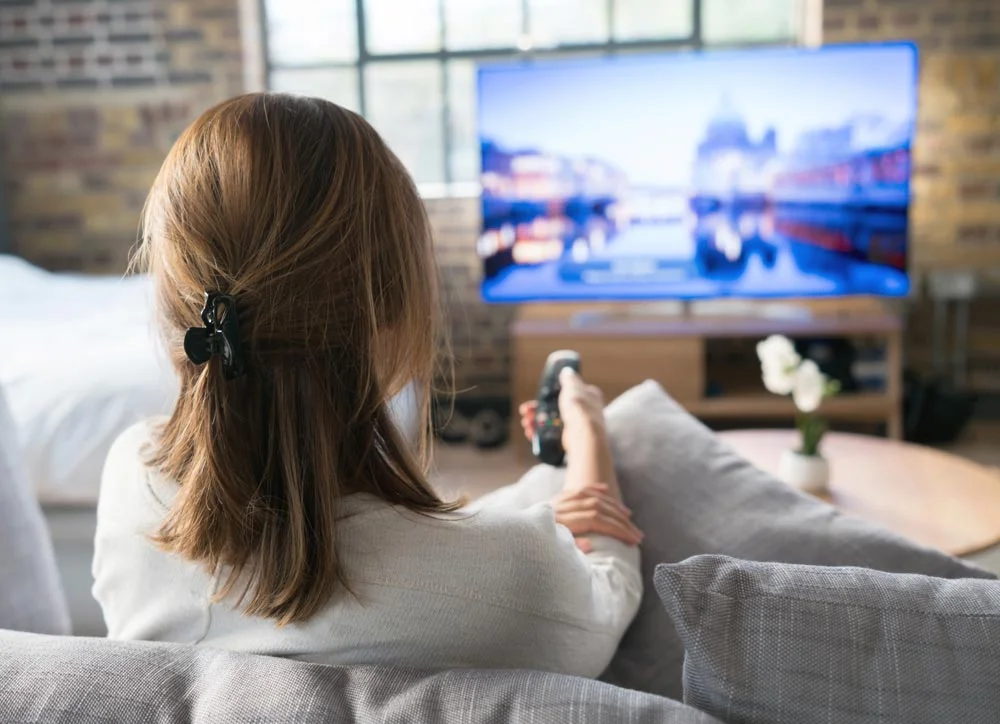
We’ve heard time and time again that we should limit TV time before bed if we want to sleep better, but this new OLED TV might actually help (not hinder) your sleep. Crazy right?
This probably comes as good news to those of us (like me) who maybe can’t help but sneak in that episode of “Bridgerton” before bed as much as we know that we should probably be off meditating or reading instead.
You’ve probably heard that blue light from our screens is bad for sleep, so what makes LG’s OLED TV screen different from other TVs? Let’s take a closer look.
The Study’s Findings
These findings about LG’s OLED TV come from a recent study conducted by LG and Kookmin University in Seoul, South Korea.
The results were based on 40 participants, half watched TV on a standard screen and the other half watched TV on an OLED screen. Researchers then measured their melatonin secretion (AKA the sleep hormone) after screentime. (1)
They found that those who watched the OLED screen saw an 8.1 percent increase in melatonin secretion, whereas those who watched TV on a normal screen saw a 2.7 percent decrease in melatonin. (1)
How Does Melatonin Affect Sleep?
This is a big deal considering that screen time usually decreases melatonin levels, making it harder to fall asleep, however, the opposite is true in this case.
Melatonin is essential in helping us sleep. Our bodies naturally secrete melatonin as a signal that it’s time to go to sleep. When melatonin production is decreased, it can make it harder to sleep.
“In addition to minimizing the negative impact on melatonin secretion during viewing time, OLED TVs have been shown to be effective in maintaining viewers’ healthy sleep patterns through greater activation of their parasympathetic nerves, which are responsible for feelings of comfort,” said Professor Kim Chang-Wook, leader of the research team, in a press release.
This is unusual for a TV screen, so why might OLED TVs be better for sleep than other TVs?
What Makes the OLED TV Different From Other TVs
OLED TVs have less blue light than other TVs, which is why they have fewer negative effects on sleep quality.
“A TV that can reduce blue light is better than one that does not,” Dr. Chelsea Perry, founder of Sleep Solutions, tells Sleepopolis.
Most TVs emit about 70-80 blue light since they rely on backlighting technology to function. On the other hand, OLED TVs only emit 36 percent blue light without using backlighting. (1)
How Does Blue Light Affect Sleep?
Blue light is harmful since night-time exposure to it is known to make it harder to fall asleep at night, creating a variety of sleep issues (it’s the same reason why sleep experts warn against scrolling on our phones before bedtime).
“Blue light, like the one from screens and gadgets, messes up our internal sleep clock by pretending to be daylight. This tricks our brain into thinking it’s daytime, so we don’t feel sleepy. It’s harder to fall asleep and sleep well when we’re exposed to this light at night,” says Dr Raj Dasgupta, Sleepopolis’s Chief Medical Advisor.
By emitting less blue light, the OLED TV is less harmful for sleep than traditional TVs. However, this doesn’t necessarily mean that watching TV at night on an OLED TV is good for you.
Alternatives to Screen Time Before Bed
Even though the OLED TV emits less blue light, it still exposes you to some degree of blue light. For the best results, sleep experts suggest limiting blue light exposure before bed.
“The final 30 minutes before bedtime should be used as a time to wind down and relax, ideally without screens. Blue light exposure from cell phones, computers, tablets, and TVs can interfere with your circadian rhythm, making it more difficult for you to fall asleep and worsen your overall sleep quality,” says Dr. Shelby Harris, Sleepopolis’s Director of Sleep Health.
As hard as it can be to stop scrolling and go screen-less before bed, sleep experts say that this might be the key to falling asleep easier for many people.
Not sure what to do without your Netflix fix? Try watching TV earlier in the evening or replace your bedtime TV time with a new activity.
“Try activities that promote mindfulness, such as reading, listening to a podcast, do some deep breathing or meditation, whatever is relaxing for you to help quiet the day for your body and brain,” adds Dr. Harris.
Still can’t give up the bedtime screens? Experts say you can at least reduce your blue light exposure in other ways.
“You can start by using blue light filters or glasses that block blue light, which can help reduce its effects on your circadian rhythm. Many modern TVs and devices also come with night mode settings that reduce blue light emission,” says Dr. Perry.
At the end of the day, nobody’s perfect and sometimes we all watch TV before bed.
Sources
- Display LG. LG Display’s OLED TV panels proven to be “sleep friendly” supporting body and eye health. www.prnewswire.com. Accessed July 23, 2024. https://www.prnewswire.com/news-releases/lg-displays-oled-tv-panels-proven-to-sleep-friendly-supporting-body-and-eye-health-302202003.html
Perry, Chelsea. Personal Interview. July 24, 2024.


























